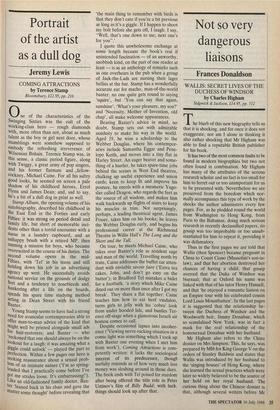Portrait of the artist as a dull dog
Jeremy Lewis
COMING ATTRACTIONS by Terence Stamp
Bloomsbury, £12.95, pp. 216
0 ne of the characteristics of the Swinging Sixties was the cult of the working-class hero — rough diamonds with, more often than not, about as much talent as the boy or girl next door, whose mumblings were somehow supposed to embody the refreshing irreverence of Wilsonian Britain. Terence Stamp was, in this sense, a classic period figure, along with Twiggy, a great army of pop singers, and his former flatmate and ,fellow- cockney, Michael Caine. For all his sultry good looks, he seemed on screen a pale shadow of his childhood heroes, Errol Flynn and James Dean; and, sad to say, he's a bit of a dull dog in print as well.
Stamp Album, the opening volume of his autobiography, described his childhood in the East End in the Forties and early Fifties: it was strong on period detail and family life, but short of memorable inci- dents other than a torrid encounter with a nurse in a laundry cupboard, and an unhappy brush with a retired MP, then running a mission for boys, who became overexcited in the course of his duties. The second volume opens in the mid- Fifties, with 'Tel' in his teens and still holding down his job in an advertising agency up west. He successfully avoids national service on the grounds of dodgy feet and a tendency to nosebleeds and, hankering after a life on the boards, spends his spare time studying method acting in Dean Street with his friend Baxter.
Young Stamp seems to have had a strong need for avuncular contemporaries able to offer man-to-man advice of the kind that flight well be printed alongside small ads for hair-restorers; and Baxter — who reckoned that one should always be on the lookout for a laugh; it was amazing what a giggle could unlock' — played the part to Perfection. Within a few pages our hero is seeking reassurance about a sexual prob- lem of an intimate nature (I'm so spring- loaded that I practically come before I've got me strides loose. It's embarrassing!'). Like an old-fashioned family doctor, Bax- ter 'leaned back in his chair and gave the Matter some thought' before revealing that `the main thing to remember with birds is that they don't care if you're a bit previous as long as it's a giggle. If I happen to shoot my bolt before she gets off, I laugh. I say, "Well, that's one down to me; next one's for you".'
I quote this unwholesome exchange at some length because the book's real if unintended fascination — of an unworthy, snobbish kind, on the part of one reader at least — is as an anthology of remarks such as one overhears in the pub when a group of Jack-the-Lads are nursing their lager bellies at the bar. Stamp has a wonderfully accurate ear for macho, man-of-the-world banter: no one quite gets round to saying `squire', but 'You can say that again, sunshine', 'What's your pleasure, my son?' and 'Necessity, Mother of Invention, old chap', all make welcome appearances.
Bearing Baxter's advice in mind, no doubt, Stamp sets out with admirable assiduity to make his way in the world. Aged 19, he wins a scholarship to the Webber Douglas, where his contempor- aries include Samantha Eggar and Pene- lope Keith, and moves into a tiny flat in Harley Street. An eager beaver and some- thing of a hustler, he takes spare-time jobs behind the scenes in West End theatres, chalking up useful experience and union cards; keen to keep fit and improve his posture, he enrols with a mesmeric Yugo- slav called Dragon, who regards the feet as the source of all wisdom, and makes him walk backwards up flights of stairs to keep his muscles in trim. Not surprisingly, perhaps, a leading theatrical agent, James Fraser, takes him on his books; he leaves the Webber Douglas early, and begins his professional career at the Richmond Theatre in Willis Hall's The Long and the Short and the Tall.
On tour, he meets Michael. Caine, who takes over Baxter's role as resident sage and man of the world. Travelling north by train, Caine addresses the buffet car atten- dant with enviable savoir faire (Extra tea cakes, John, and don't go easy on the butter'); in Bradford Tel mistakes a bidet for a footbath, 'a story which Mike Caine dined out on more than once after I got my break'. They share a flat together: Caine teaches him how to eat beef vindaloo, turns girls to jelly with his 'cobra' look from under hooded lids, and bustles Ter- ence off-stage when a glamorous Israeli air hostess comes to call.
Despite occasional lapses into incoher- ence (`Viewing nerve-racking situation in a comic light was something which I took up with Baxter one evening when I met him from work'), Coming Attractions is com- petently written: it lacks the sociological interest of its predecessor, though usefully reminds us of how very much less money was sloshing around in those days. The book ends with Tel poised for stardom after being offered the title role in Petei Ustinov's film of Billy Budd; with luck, things should look up after that.


















































 Previous page
Previous page